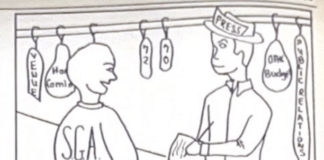
Managing Editor’s Note: Since publishing my recent article about hostility I’ve encountered as a student journalist, I’ve received overwhelming support from students, staff and faculty alike. One such supporter, Jack Trabucco, is also a staff writer for The Whit, and he wished to share his thoughts in the form of this article.
I feel that Trabucco and I disagreed on the main takeaway of the incident. The entire editorial staff also disagrees and would like to make it clear that this article reflects only the views of Trabucco, and not those of the Whit editorial staff. However, we acknowledge that Trabucco’s belief is one that many people, both inside and outside the Rowan community, share, and that it should not be censored – no matter how offensive we may find it.
However, we also believe that these statements should not be published unchallenged. Trabucco understood that the publication of this article would involve me also publishing a response, which can be found here.
In last week’s issue, my colleague Tara Lonsdorf put out a brilliant opinion article describing her experiences with negative feedback — how it hurt her, how she overcame it and how it strengthened her for the future. In the piece she describes several instances in her journalism career wherein even minor oversights or miscommunications resulted in exceedingly negative, almost comical, insults of her person, her skill and her institution. In each event, Tara, being the mature professional that she is, issued an apology and did all in her power to rectify the situation. The pain was still there, of course, but each little jab served much like a vaccine: building up her immunity to corrosive criticism and infectious negativity by sharpening her skills for the next time.
I feel Tara’s story holds two meanings. The first is the one Tara herself realized: finding the proper way to respond to negative criticism is crucial in the lives and careers of anyone expected to produce media to be used and consumed by a greater community. This includes basically everyone in the work force, but is especially present among writers, who hone their talents by criticizing one another. Routinely getting offended by good-faith criticism is reductive to both the critic and the criticized, resulting in little more than a worse product and bitterness between peers.
Good-faith criticism is when somebody takes the time and energy to evaluate the full context and intent (within their resources) of something, be it a film, book, etc., and regardless of their personal feelings toward the work, uses reason and evidence to explain its flaws, relative to other works.
But what about bad-faith criticism?
Bad-faith criticism is when somebody, intentionally or not, uses their personal feelings toward a work to gauge its objective quality (i.e. “I don’t like it therefore bad”), omitting reason, evidence and broader context. Bad-faith criticism is a lot easier and more fun to make because, a, we don’t have to search outside our own sphere of knowledge to do so, and b, finding people who agree makes us feel more secure in our opinions.
In truth, bad-faith criticism (as I’ve defined it) is not criticism at all: it’s opinion. Opinions which people are allowed to have and to voice but should not be treated as measures of objective quality. In fact, bad-faith criticism is ultimately worthless except to the critic because it is based on feelings rather than objective truths. Furthermore, it can be damaging to the work (and, by extension, the author) being criticized because it poisons the well of available public opinion for newcomers to the work.
It can be hard to tell the difference between good- and bad-faith criticism, especially today. Critics are often inclined to be as brutal as possible (say, if they monetize it on YouTube), while content creators are encouraged to remain stalwart and accepting of every comment lobbed their way, no matter how relevant and well-constructed or absurd and insulting it may be.
And that logic extends outward to every disagreement between two people. I’ve put out numerous pieces describing my beliefs on civil discourse and how hard it is to have a conversation with another human being, but I’ve never truly elaborated on the standards needed for two people to do so.
It is my heartfelt belief that anyone who resorts to personal attacks, knowingly dishonest claims and semantically charged allegations for the purpose of making their opponent seem evil or untrustworthy are not worth conversation with. Anyone willing to call others racist or predator or white supremacist had better have irrefutable, airtight proof to back that claim up. Otherwise, all they have are feelings. Feelings which they, again, are allowed to have and voice, but are meaningless in the context of debate, and are in fact detrimental to debate because just hearing the terms is enough to spread bias and unease.
Any self-respecting person who would resort to such nonsense has nothing substantial left with which to argue their position, so they throw sand in the hopes of making their opposition into a villain. Such tactics are childish, intellectually dishonest and do not deserve good-faith back.
So the next time you find yourself against the academically bankrupt, who forgo reason and truth and respect to instead appeal to feelings and superficial ideas of right and wrong, do not give them a single inch. Don’t apologize; by vilifying such people, you show them that their tactics work, which guarantees they’ll use them again. But don’t fight fire with fire; don’t stoop to their level. Instead, stand against the tide, no matter how hard they try to shout you down. Because if they win, the battlefield is theirs. Productive civil discourse becomes harder and harder when reason loses ground. As academics, and as people, we have a duty to ourselves, our predecessors and especially those that will come after us to maintain the standard of truth and good-faith criticism at the table of discussion. If those things are lost, we revert to screaming moral absolutists, unable to get a word in over the other because we’re so absorbed in our own feelings.
That, in short, is the end of discussion.
For comments/questions about this story, tweet @TheWhitOnline




